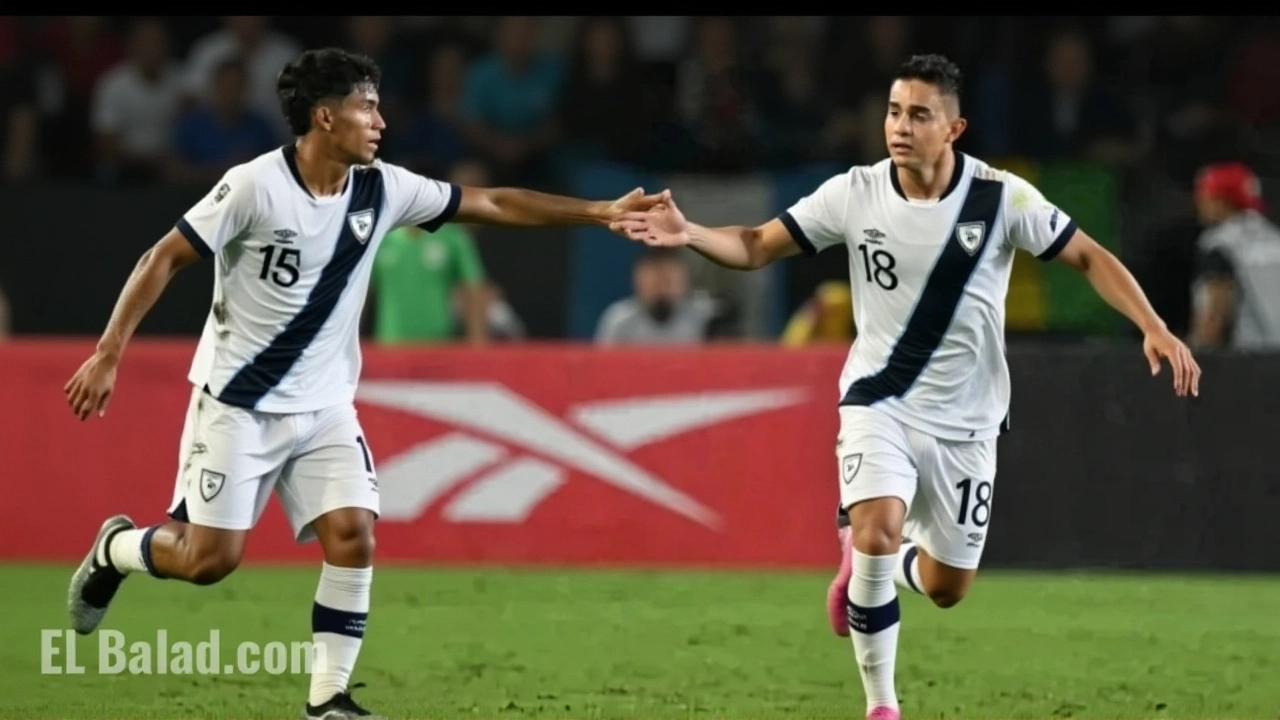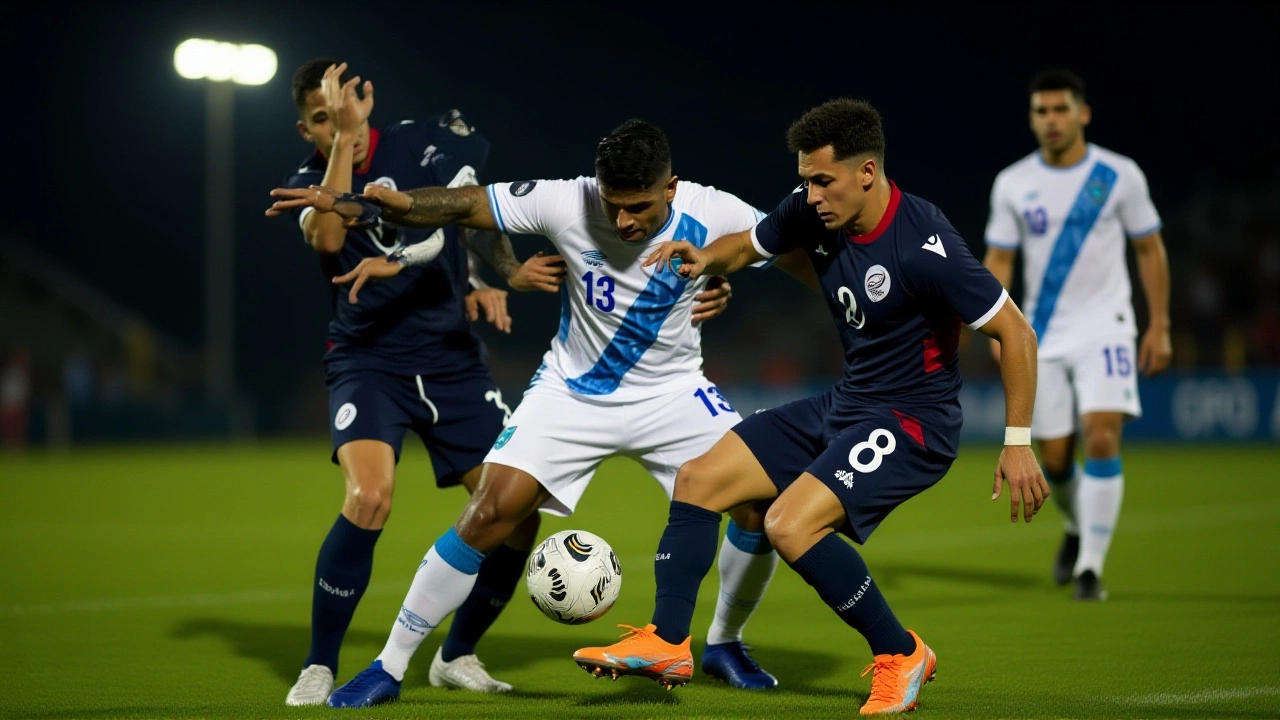On Wednesday, November 19, 2025, at 01:00 UTC, Estadio El Trébol in Guatemala City will host a match that could rewrite football history — Suriname vs. Guatemala — in the final CONCACAF World Cup Qualifying Third Round Group AGuatemala City fixture. For Suriname, a single point is all that stands between them and their first-ever FIFA World Cup appearance. For Guatemala, it’s about dignity after their dreams were crushed.
History in the Making — Suriname’s Moment
Suriname, a tiny nation of just 600,000 people nestled on the northeastern coast of South America, has never played in a World Cup finals. Not in 1930. Not in 2022. Not even once. But now, with nine points from five matches — two wins, three draws — they sit atop Group A, one point ahead of Panama. Their 4-0 demolition of El Salvador on November 14, 2025, wasn’t just a win; it was a statement. Goals from Tjaronn Chery, Dhoraso Klas, and a two-minute brace from Richonell Margaret sent shockwaves through CONCACAF. Their defense? Impeccable. Just 0.57 goals conceded per game across the entire qualifying campaign. That’s better than the United States. Better than Mexico. Better than nearly every team in the region.
Coach Stanley Menzo, the Dutch-Surinamese tactician who once managed Ajax’s youth academy, has built something special. Compact. Disciplined. Deadly on the break. As Scores24.live analysts noted, Suriname doesn’t need to dominate possession — they just need to survive the first 20 minutes and then strike. They’ve done it five times in a row without defeat. And now, in front of a hostile crowd in Guatemala City, they have a chance to make history.
Guatemala’s Heartbreak — A Team Without a Future
Meanwhile, Guatemala’s fate was sealed on November 14, 2025 — the same day Suriname crushed El Salvador. In a match that felt like a movie script, Guatemala came back from 2-0 down against Panama to level at 2-2, thanks to two substitute goals from Rudy Muñoz. They had 22 shots. An expected goals (xG) value of 2.70. They controlled the ball for 49% of the match. And still, they lost 3-2. A late penalty. A cruel twist. A final whistle that didn’t just end the game — it ended their World Cup dreams.
Head coach Luis Fernando Tena, the Mexican veteran brought in to steady the ship, now faces a team with nothing left to play for but pride. Guatemala’s record? One win, two draws, two losses. Five points. Only one victory in their last five games. They’ve scored under 1.5 goals in six of their last seven matches. Their defense? A sieve — 1.57 goals conceded per game. They’ve had chances. They’ve had moments. But they’ve never had the consistency. Not in this round. Not under pressure.
Statistical Divide — More Than Just Numbers
The numbers tell a story no pundit can ignore. Suriname has averaged 1.43 goals scored and 0.57 conceded per match. Guatemala? 1.29 scored. 1.57 conceded. Suriname has won 50% of their matches in this phase. Guatemala? Just 20%. Even at home, where Guatemala has averaged two goals per game in tournament matches, their opponents have scored 1.22 per game — a worrying trend against a side like Suriname that rarely gives up.
Head-to-head? They drew 1-1 in October. But that was a different Guatemala — one still clinging to hope. Now, they’re emotionally drained. Suriname, by contrast, is riding a wave of belief. Bookmakers are split: Eaglepredict.com gives Guatemala a 36% chance to win, Suriname 33.6%. But prediction sites like Footballpredictions.com and Sportsmole.co.uk aren’t fooled. Both predict Suriname wins — 0-1 and 0-2 respectively. Both say “Both Teams to Score: No.” Both say “Under 2.5 Goals.” They see a tight, tense, tactical battle — and a Suriname side that knows exactly how to win when it matters most.
The Stakes Beyond the Scoreline
This isn’t just about a World Cup ticket. It’s about legacy. For Suriname, it’s the first time their national team has ever been this close. Their players — many of whom play in the Dutch lower leagues, in Belgium, even in the Caribbean — have spent their careers dreaming of this moment. Imagine being the first Surinamese to step onto a World Cup pitch. That’s not just a career highlight. It’s generational.
For Guatemala, it’s the latest chapter in a 70-year tale of near-misses. They’ve come close — in 1981, in 2001, in 2017. But they’ve never broken through. The pressure to qualify is immense. The disappointment of falling short? Crushing. This match won’t define Tena’s tenure — he’s already been given the task of rebuilding. But it will define this generation of Guatemalan players. They won’t go to the World Cup. But they can go down fighting.

What’s Next?
If Suriname draws or wins, they qualify automatically. Panama, with six points, will then need to beat Canada in their final match to have any shot at a playoff spot. If Suriname loses? Then Panama and Suriname finish level on points, and goal difference becomes the decider — a scenario that would leave Suriname’s fans on the edge of their seats until the final whistle of the Canada-Panama game.
For Guatemala, the focus shifts to the next cycle. Tena will likely rebuild with youth — players like 18-year-old midfielder Ordonez, who came off the bench against Panama and showed flashes of promise. The federation knows the system needs overhaul. The infrastructure. The youth development. The coaching pipeline. But for now, they have one last match. One last chance to make their fans believe, even if the world won’t.
Historical Context — Why This Matters
Suriname’s football identity is unique. Many of their players hold Dutch passports. Some grew up in Amsterdam. Their national team is a bridge between continents — Caribbean flair, Dutch discipline, South American grit. Their 1982 World Cup bid was famously derailed by political pressure. Their 2014 campaign ended in heartbreak against Honduras. This time? No distractions. No politics. Just football.
Guatemala, meanwhile, has never advanced past the third round of CONCACAF qualifying since the current format began in 2000. They’ve qualified for the Gold Cup 14 times. But the World Cup? A phantom. Even their 1981 campaign — when they nearly qualified — ended in controversy, with allegations of match-fixing in a final group match against El Salvador.
Now, on a cold November night in Central America, the world watches. One team seeks redemption. The other, glory.
Frequently Asked Questions
What does Suriname need to qualify for the 2026 World Cup?
Suriname needs only a draw against Guatemala to secure automatic qualification. With nine points and a superior goal difference over Panama, even a 1-1 result would guarantee them first place in Group A and a direct spot in the 2026 FIFA World Cup in North America. A loss would force them to rely on Panama’s result against Canada, making their fate dependent on another match.
Why has Guatemala struggled so much in this qualifying cycle?
Guatemala’s struggles stem from inconsistent attacking output and defensive fragility. Despite dominating possession in several matches — like their 22-shot performance against Panama — they’ve failed to convert chances efficiently. Their xG values often outpace actual goals scored, indicating poor finishing. Additionally, their defense has conceded 1.57 goals per game, the worst among top-three teams in Group A, revealing tactical and organizational flaws.
Who are the key players to watch in this match?
For Suriname, Richonell Margaret — who scored two goals in four minutes against El Salvador — is in red-hot form. Tjaronn Chery, the veteran winger with Dutch Eredivisie experience, controls the tempo. For Guatemala, Rudy Muñoz, who scored twice as a substitute against Panama, could start after proving his clutch ability. Goalkeeper Carlos Villanueva will need to be at his best to keep Suriname’s dangerous counterattacks at bay.
Has Suriname ever come close to qualifying before?
Yes. In 1982, Suriname qualified for the final round of CONCACAF qualifying but withdrew under political pressure from the Dutch government, fearing player eligibility issues. In 2014, they lost a playoff to Honduras on away goals after a 1-1 aggregate. This is their third time reaching the final qualifying stage — and the first time they’ve been in a position to qualify without needing to win their final match.
How significant is this match for CONCACAF as a whole?
This match highlights the growing competitiveness of CONCACAF beyond the traditional powers. Suriname’s potential qualification would be the first by a non-traditional team since Jamaica in 1998. It signals a shift in the region’s balance of power, where smaller nations with smart coaching and disciplined tactics can now compete with giants. If Suriname qualifies, it could inspire other Caribbean and Central American teams to invest in long-term development over short-term fixes.
What happens if Suriname doesn’t qualify?
If Suriname loses and Panama beats Canada, Panama would finish first on goal difference, and Suriname would drop to second — forcing them into a playoff against the fourth-place team from the final round. That playoff would be a two-leg tie, likely in March 2026. But with Suriname’s current form and Panama’s inconsistent defense, a loss here would be a massive setback — and could delay their World Cup dreams for another decade.
